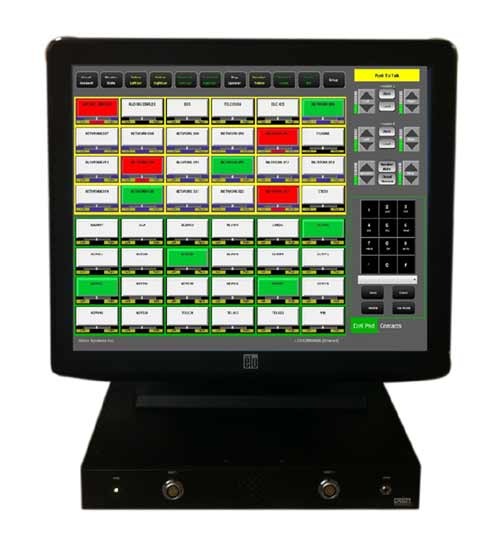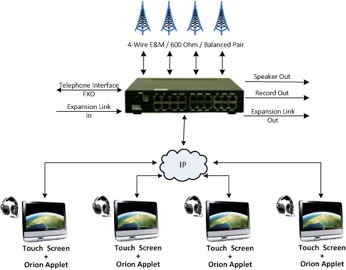
Radio Dispatch Solution Used by Service Techs Now Use IP Based Systems

The utilization of IP-based systems in radio dispatch solutions has become prevalent among service technicians in today's tech-driven era. Industries such as cable installation, residential HVAC repairs, and utility services are witnessing a significant shift in managing their logistical operations. The traditional reliance on analog radio communication is being supplanted by advanced IP-based radio dispatch systems, offering heightened efficiency, flexibility, and cost-effectiveness. This article aims to delve into the realm of IP-based radio dispatch systems, their advantages, and the strategies for organizations to transition from older analog systems to embrace this state-of-the-art technology.
Communication Evolution in Service-Centric Sectors
Service-oriented sectors form the backbone of modern society, ensuring the seamless provision and maintenance of essential utilities. Whether it's cable installers connecting homes to the digital sphere or HVAC technicians ensuring comfortable indoor environments, effective communication stands as a linchpin in their day-to-day activities.
Traditionally, these sectors relied on analog radio communication systems to coordinate their workforce. However, with the rapid technological advancements, the limitations of analog systems have become increasingly apparent. This has led to a fundamental shift toward IP-based radio dispatch systems leveraging the capabilities of the internet and digital communication.
According to a study by the International Wireless Communications Expo (IWCE), service-centric organizations are progressively embracing IP-based solutions due to their superior functionality and adaptability in managing field personnel. The Federal Communications Commission (FCC) also acknowledges the potential of IP-based radio dispatch systems in improving interoperability and optimizing spectrum use.
The Potency of IP-Based Radio Dispatch Systems
IP-based radio dispatch systems harness the internet and digital networks to offer a multitude of benefits to service-centric organizations. The crux of these communication systems is often the radio dispatch consoles. Various industries, including public safety, transportation, utilities, and service-oriented sectors, are embracing this digitalization trend. These consoles act as central hubs for overseeing and coordinating radio communications. IP consoles facilitate real-time communication, location tracking, and data exchange, empowering field personnel to work more efficiently. Here's a closer look at their key advantages:
1. Enhanced Communication: IP-based systems facilitate clear voice communication and real-time transmission of crucial data like work orders, photos, and documents, ensuring technicians have immediate access to necessary information.
2. Location Tracking: Integration with GPS allows dispatchers to track field personnel's precise locations, optimizing routes and resource allocation, thereby reducing travel time and improving response times.
3. Multichannel Support: Unlike analog systems limited to a single channel, IP-based systems support multiple channels, enabling simultaneous communication on different topics, enhancing overall coordination.
4. Scalability: IP-based systems are highly scalable, accommodating the evolving communication needs of growing organizations by effortlessly integrating new users and features.
Hardware Components of IP-Based Radio Dispatch Systems
IP-based radio dispatch systems consist of several hardware components operating in unison to establish a seamless communication network:
1. Digital Radios: Designed to function over the internet or private IP networks, these radios come with advanced features like Wi-Fi connectivity, text messaging, and GPS tracking, preferred over older analog radios.
2. Dispatch Consoles: Serving as central control hubs, these radio dispatch consoles enable dispatchers to manage communication channels, monitor field personnel, and coordinate activities.
3. Infrastructure: Robust IP networks (WAN, LAN, or fiber backbone), including servers, routers, and switches, support data transmission and connectivity in IP-based radio systems.
4. Accessories: Essential accessories like headsets, microphones, and chargers enhance the usability and functionality of IP-based radios.
Transitioning from Analog to IP-Based Systems
Many service-oriented organizations have substantial investments in analog radio units. The transition to IP-based systems can be gradual, incorporating newer technology cost-effectively without discarding existing analog radios.
Bridging solutions enable seamless integration of older analog units with IP-based systems, allowing organizations to leverage their current infrastructure while gradually introducing newer digital mobile radios as required. This phased approach ensures substantial cost savings and a smoother transition.
Interoperability and Compatibility
The concept of "interoperability" holds utmost importance in integrating diverse devices within interoperable communication systems. Interoperability refers to the seamless operation of various components, often from different manufacturers, working together harmoniously.
To ensure interoperability, organizations must adopt standard protocols, open interfaces, and collaborate with vendors prioritizing compatibility within interoperable communication systems. This approach ensures effective communication between different devices and systems, contributing to smoother operations.
Significance of Communication System Providers
The shift to IP-based radio dispatch systems marks a revolutionary transformation in how service-oriented organizations manage their logistics. The undeniable benefits of improved communication, location tracking, and scalability are evident. Moreover, the ability to integrate existing analog radios offers cost-effective solutions for organizations adopting this technology while retaining their old equipment.
However, it's essential to emphasize the importance of collaborating with communication system providers during implementation. These providers possess the expertise to assess specific organizational needs, design tailored solutions, and offer continuous support to ensure the system's success.
As service-oriented industries continue evolving, it's evident that IP-based radio dispatch systems will be pivotal in their success. The capability to stay connected, communicate effectively, and adapt to changing demands enables these organizations to deliver essential services with utmost efficiency and reliability. Embracing the future of communication is not merely an option but a necessity for the modern service industry.
0 Comments Add a Comment?